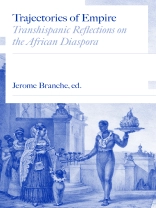Trajectories of Empire extends from the beginning of the Iberian expansion of the mid-fifteenth century, through colonialism and slavery, and into the twentieth and twenty-first centuries in Latin American republics. Its point of departure is the question of empire and its aftermath as reflected in the lives of contemporary Latin Americans of African descent and of their ancestors in the historical processes of Iberian colonial expansion, colonization, and the Atlantic slave trade.
The book’s chapters explore what Blackness means in the so-called racial democracies of Brazil and Cuba today. Among the historical narratives and themes it covers are the role of medical science in the objectification and nullification of Black female personhood during slavery in nineteenth-century Brazil; the protocols of portraiture in the colonial period that, in including enslaved individuals, pictorially highlight and freeze their supposed inferiority vis-à-vis their owners; and those aspects of discourse that promote colonial capture and oppression in terms of evangelization and the saving of souls, or simply create the discursive template as early as the fifteenth century, for their continued alienation and marginalization across generations.
Trajectories of Empire’s contributions come from the fields of literary criticism, visual culture, history, anthropology, popular culture (rap), and cultural studies. As the product of an interdisciplinary collective, this book will be of interest to scholars in Iberian or Hispanic studies, Africana studies, postcolonial studies, and transatlantic studies, as well as the general public.
สารบัญ
Introduction
Jerome C. Branche
Part I: The Iberian Scenario
Chapter 1: Tracing the ‘Fragmentary Facts’ of a Foundational Slave Voyage
Elizabeth R. Wright
Chapter 2: Christianos nigros: Afro-Iberian Confraternities’ Social and Cultural Roles
Miguel A. Valerio
Chapter 3: In Search of the Black Swordsman: Race and Martial Arts Discourse in Early Modern Iberia
Manuel Olmedo Gobante
Chapter 4: On Enslaving and Impalement: The ‘Life’ and Death of Chicaba, Black Woman Saint in Empire
Jerome C. Branche
Part II: Continuing Expansionism and the Circum-Atlantic
Chapter 5: Facing the Enslaved: Explorations for a Transatlantic Archive
Agnes Lugo-Ortiz
Chapter 6: A Postcard from Wakanda to the King of Spain: The Portrait of the Mulatos de Esmeraldas (1599)
Baltasar Fra-Molinero
Chapter 7: A Transhistorical and Translocal View of the Luso-Brazilian Imperial/Colonial World through the Poetry of Gregório de Matos (1636–1695) to Domingos Caldas Barbosa (1740–1800)
Lúcia Helena Costigan
Chapter 8: Silences and the Corporeal: The Enslaved Body in (Historical) Pain
Cassia Roth
Part III: Afro-Latin America: Black Marginality in the New Century
Chapter 9: Racial Dynamics and Tensions in Twenty-First Century Post-Revolutionary Cuba
Alberto Abreu
Chapter 10: Senzalas e Quilombos Modernos: Evoking the Legacy of Slavery in Brazilian Hip Hop
Eliseo Jacob
Chapter 11: Honoring the Bones beneath Us: Conjuring Black Heritage in the Performances of ‘Intervenções Urbanas’ in the Gamboa Neighborhood, Rio de Janeiro
Maria Andrea dos Santos Soares
Index
เกี่ยวกับผู้แต่ง
Baltasar Fra-Molinero is Professor of Spanish and Latin American Studies at Bates College.












